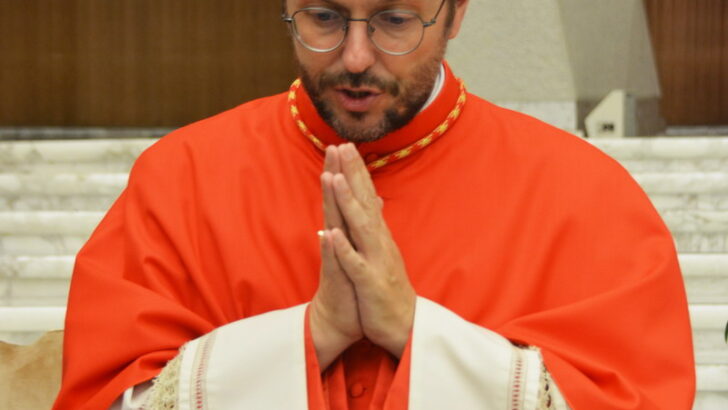Luca Attanasio
Until the most recent appointments, at 50 years of age he was the youngest cardinal in the College of Cardinals (now Mykola Bychok, bishop of the Saints Peter and Paul eparchy of Melbourne of the Ukrainians, aged 44 has become the youngest, ed.) and among those called to a complex task of Christian presence in a land, Mongolia, which is geographically and culturally distant. Giorgio Marengo, who has been Apostolic Prefect of Ulaanbaatar, the capital of Mongolia, since August 8, 2022, was born in Cuneo, near Turin, north of Italy, in 1974 but has almost always lived in Turin. After studying Philosophy and earning a doctorate in Missionology in Rome, Giorgio Marengo made his perpetual profession on June 24, 2000 as a missionary of the Consolata (I.M.C.), and was ordained a priest in 2001.
His commitment immediately skewed toward Asia with several assignments among which Asia regional counselor, superior for Mongolia and pastor of the parish church of Mary Mother of Mercy in Arvaiheer. Then two years ago Pope Francis first named him Apostolic Prefect and then Cardinal. Mongolia is a country both geographically and culturally sandwiched between Russia and China, but it has its own thousand-year-old culture and is the 19th largest state in the world although its population is only 3 million. Christians are a small minority and Catholics a minority of the minority: only 1,300.
Pope Francis, wanted to emphasise the importance of this country, beyond the minimal presence of Christian faithful, by traveling there in late August and early September 2023. A trip that, beyond the pastoral sense, aims to create points of a geopolitical nature with neighboring and influential China, as well as Russia,
The Synodal Times met Cardinal Marengo who was in Rome for two special occasions. The sessions of the Synod on Synodality which he defined as “animated by a very good spirit of communion and harmony, a crucial moment to answer a fundamental question: how to be a synodal Church in mission” and a chance to focus on “the spirit that speaks within and around us in order to help the Church to relaunch itself in its mission both universal and specific that we missionaries embody”; and the happy occasion of the canonisation of Giuseppe Allamano, founder of the Missionaries and Missionaries of the Consolata.
Your Eminence, what is the significance of the presence of Christians in Mongolia and in particular its role as well as the missionaries and missionaries of the Consolata? What are the main problems of Mongolian society and how do missionaries experience a rootedness in this society?
The small Mongolian Christian community (even more modest, if we limit ourselves to the Catholic membership) is like a Gospel seed in the larger society of the country, which historically has other religious references. This is a rapidly evolving society, facing the challenges of the market economy and having to play its own difficult role in the delicate geopolitical balance of the macro-region in which it is located (Russia and China the only neighbouring countries).
Improved general living conditions compared to even a mere two decades ago are welcome, but an unscrupulous race for enrichment is also creeping in that can actually create dangerous social inequalities, to the detriment of the weakest. The Church’s commitment to social work (which accounts for 70 percent of its activities) is a sign of its desire to continue to accompany people in their quest for authentic human advancement, with special attention to those most in need”.
Nearly a century after his death, Giuseppe Allamano is proclaimed a saint, what is his relevance 100 years later and what are the challenges facing the Institute to remain faithful to his call and desire to impact society especially in the most remote and seemingly forgotten areas?
“The beauty of holiness is to be ever timely. Giuseppe Allamano, like all saints recognised by the Church, allowed himself to be crossed by the light of Christ, becoming himself so luminous that he drew to the Lord. The challenge for the missionaries and missionaries founded by him is to know how to imitate him by continuing to give concreteness to what the Holy Spirit wanted to arouse in the Church precisely through St Giuseppe Allamano: the gift of the mission ad gentes, that is, the proposal of the Gospel to those human groups that have not yet been confronted with it. For us, this canonization is an immense gift and at the same time a heightened responsibility, that of living the mission with the spirit desired by Allamano. His figure must therefore be better and better known and deepened, so that it may be an inspiration and reference for the missionary choices we are called to make today, in fidelity to his original inspiration.”
The men and women missionaries have chosen to celebrate the canonisation, in addition to the many celebrations, with moments of reflection and denunciation of the serious problems that the communities you are alongside are experiencing in so many parts of the world.
How much is it part of your vocation to be free-spirited and decolonized men and women who truly live sharing with the peoples alongside whom they have a rooted presence?
“The Gospel is always a ferment of justice and peace and therefore impels those who witness to it to become promoters of these values among the peoples to whom they are sent. To expend oneself for the dignity of every person, promoting his or her authentic integral development, is inherent to the missionary vocation. This is why the missionaries and missionaries of the Consolata feel that they participate in the paths of freedom and protection of the rights of all human groups in which they carry out their service, often becoming special witnesses and active disseminators of a culture of justice, fraternity and protection of creation”.


